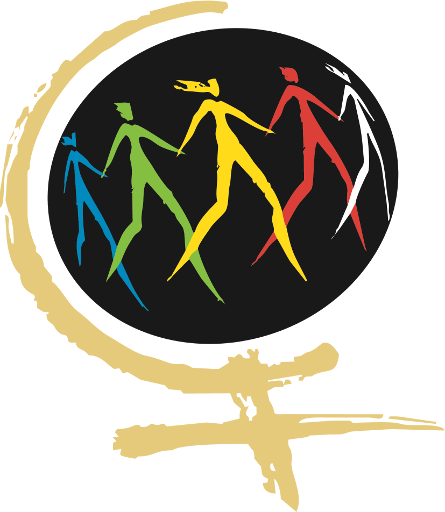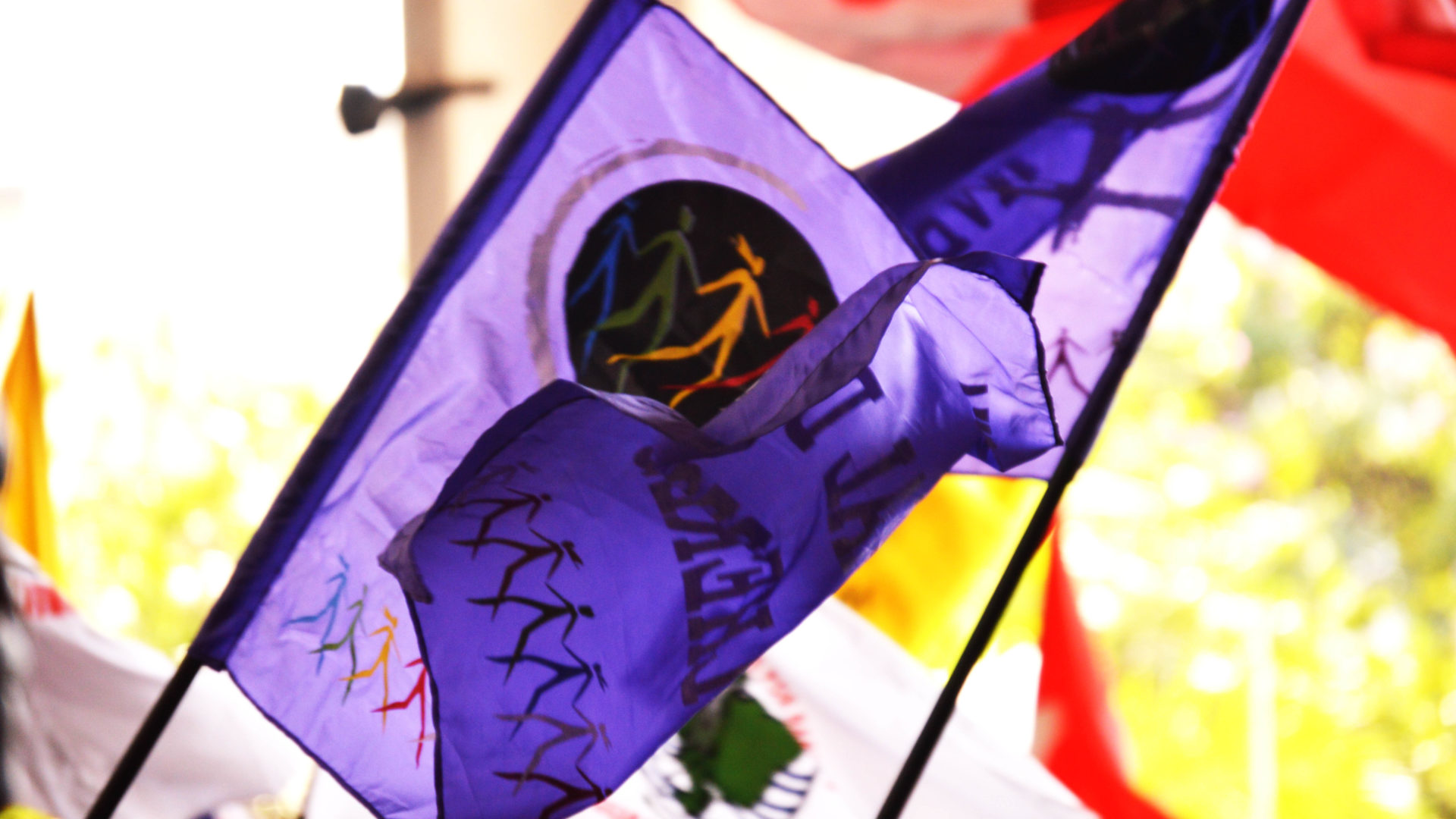Every 5 years, an international action of the World March of Women brings us together and mobilises us, connecting our local organisational processes and struggles to the international strength of feminism in movement. Our international actions are moments for constructing and expressing our political syntheses articulated at the local, regional and international level, which present our denunciations and proposals. This will be the WMW’s fifth international action and it will be marked by resistance to capital’s attack on life and the rise of conservatism and authoritarianism in different parts of the world. Our resistance marches together with our proposals and our practices to build strength, the self-organisation of women and feminism as the foundation for systemic alternatives. During our fifth international action, we will strengthen our symbol and political identity, revisit our collective memory of two decades of action and advance in the construction of the World March of Women as a permanent feminist, anti-capitalist and anti-racist movement of struggle.
Visions guiding the 2020 action
The World March of Women fights against the capitalist, hetero-patriarchal, racist, colonial model. The current context is marked by a conservative and neoliberal offensive on the lives, territories and work of women and the poor. From an economic point of view, the imposition of fiscal austerity policies dismantles and blocks redistributive and welfare policies and reinforces the market’s power over all spheres of life. The expansion of financial capitalism is advancing into the territories and lives of the peoples via various structures of the state and democracy. The current neoliberal offensive has different elements from the ones of the previous period: it attacks democracies and strengthens authoritarianism and its conservatism is closely linked to plans to exert power and control over the peoples and women.
This is why we do not separate “moral values” from economic issues. In many places, the neoliberal version of capitalism uses conservatism and glorifies maternity to force women out of the ‘public and productive’ world: it manipulates unemployment rates and, at the same time, transfers the responsibilities of social reproduction that are not covered by public policies to women in the home.
Feminism has grown in strength and mobilising capacity. The current context raises two specific challenges for our movement: the challenge of reversing individualist tendencies that divide women by strengthening women’s collective processes of self-organisation and that of going beyond mass demonstrations to guarantee the continuity and expansion of grassroots organisational processes. By using the diversity of our voices to express the concrete reality of women in public, we will defeat individualism and fragmentation.
Our history and collective construction processes are our strength. The 2020 action has the challenge of recovering the history of our movement and positioning ourselves vis-à-vis this context marked by many challenges: ‘We resist to live, we march to transform’ is a slogan that combines resistance with proposals and concrete advances in the construction of a society based on equality, justice, freedom, peace and solidarity.
What are we resisting?
We women are under attack. The rise of the extreme right at the global level, together with the resurgence of racism and xenophobia target women’s bodies, desires and lives. While representatives of the elite implement austerity programmes, the power of the market attacks the public nature of the state and the guarantee of rights. Under the growing authoritarianism and violence of the extreme right in the world lies an anti-feminist agenda that combines the dynamics of domination and exploitation based on class and race.
Militarisation and transnational armies are well-known tools of this model. They impose systematic violence, terror, violations and assassinations on the peoples and social activists.
Transnational corporations are direct agents of capital and have more power than ever!
While the majority of the population is under attack, corporations continue to encroach on territories, control and privatise land and use nature as an inexhaustible resource for generating profit. They have even turned natural processes, such as the capacity to absorb carbon dioxide, into commodities. “Green economy” initiatives are spreading to all countries in the world with forests. These initiatives allow polluters – companies and countries – to continue destroying nature but transfer the responsibility of preserving nature to communities through carbon credits and payment for environmental services.
Similarly, transnational corporations are making advances in the world of work. They strive to free themselves from more and more labour obligations, while intensifying their exploitation of men and women workers. Precarious jobs with no rights are increasingly common. The growing digitalisation of the world of work is an expression of this exploitation. We know that it is connected to the increase in the power of transnational corporations, which put profit before everything else.
We mobilise, organise and fight to resist
As a feminist, anti-capitalist, anti-patriarchy, anti-racist and decolonial movement, our 2020 action has the challenge of coordinating actions that directly confront right-wing, authoritarian and neoliberal forces that impose themselves on the state through anti-democratic processes or in democracies controlled by capital. Our actions must also question the power of transnational corporations as agents at the service of capital that violate our territories and our bodies, exploit our labour and aim to control our lives and the way we relate to one another. Coordinating these two axes in our resistance is fundamental to ensure that our anti-capitalist, anti-racist, decolonial, feminist strategy has a real impact on the current context.
What change are we fighting for?
With the self-organisation of women as our basis, we fight to radically change the world we live in. The principles of this construction process are popular sovereignty and the self-determination of the peoples. We are changing the model of reproduction, production and consumption to one based on food sovereignty and agroecology. We affirm the feminist economy as a tool for placing the sustainability of life at the centre of social organisation. We fight for climate justice and we reclaim and defend knowledge and ways of life that are incompatible with the logic of capital. We defend public services that support and guarantee social reproduction. We fight for all women’s autonomy over their lives and their bodies, which becomes a reality when we all have this autonomy.
In the design of our action in 2020, we need to combine the vision of the world we are building and in which we want to live with denunciations of the forces that dominate and destroy, political education actions and mobilisations.
The challenges and objectives of the 2020 action are:
- To position our feminism in the current context, in opposition to feminism that has been domesticated by the UN, bourgeois feminism and individualist feminism. We want to affirm a feminism based on a collective subject, which engages in actions on the streets and permanent processes of grassroots and popular organising, and on the principle of internationalist solidarity among peoples and women.
- To strengthen our strategic alliances with social movements, in dialogue with existing initiatives.
- To coordinate actions at the local level, where we recuperate processes of resistance and regional and global organising based on this re-positioning of the WMW.
- To map out, give visibility to and create alliances and dialogues with/between real alternatives.
Forms of action
- Combine information/training actions – denunciation – formulation/affirmation of alternatives.
- Organise the calendar of action with dates that concretise the action’s content. Reference dates are: 18/02 – Sahrawi women’s day (coordinate with NCs from Africa that are organising for this day); 08/03 – define a common action that unites us as a global movement on International Women’s Day; 24/04 – 24 hours of feminist action; 17/10 – closure.
We will need to organise the proposals of dates according to the political agendas that mark our fifth action: for example, one day focused on transnational corporations, one day focused on alternatives, one day – or more moments of grassroots organising/training, sit-ins, meetings, public demonstrations, etc. We could think of organising 20 days of action during periods of action with common themes. - National and regional actions and a common international event. Challenge of ensuring that the actions – even the local ones – are connected.
- Reflect on what kind of joint international event we can organise together with the Feminist School, which is planned for August 2020 but coordinated by organisations outside the WMW.

